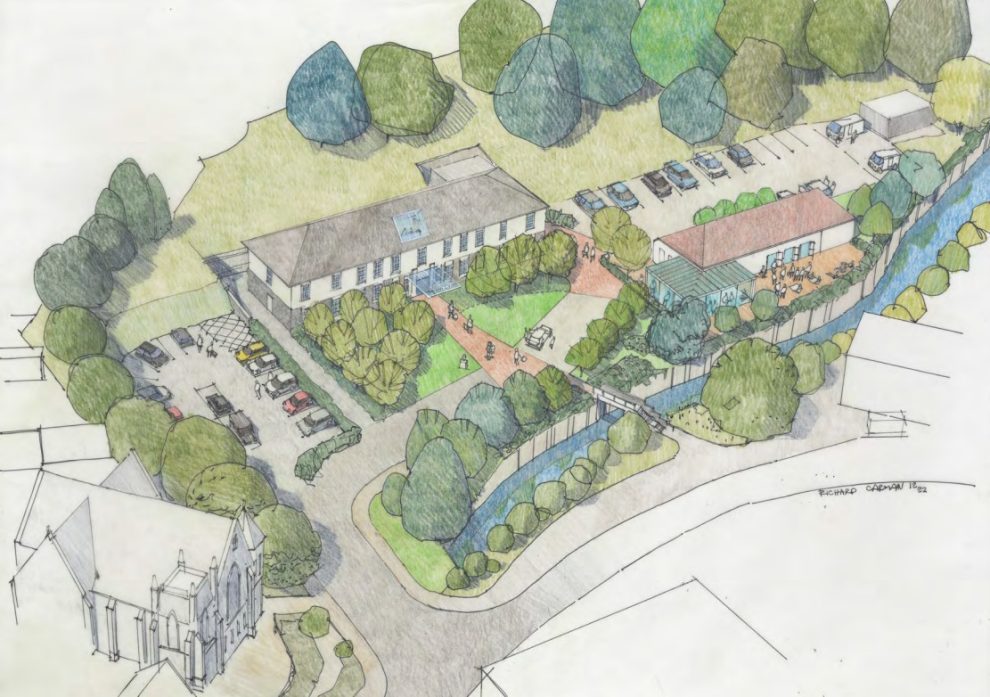WITH 2024 now upon us, it seems like a good time to have a look at how some of the key major developments in Rhondda Cynon Taf are progressing.
From new schools, to a major council-run solar farm, and from a new hotel to new housing developments, here we take a look at how some of the big projects we’ve covered recently across RCT are getting on.
First up we have plans for a large council-owned solar farm which is set to provide power to the Royal Glamorgan Hospital.
A recent council scrutiny committee meeting heard that work was set to start on the six megawatt project this year with 1 megawatt set to go to the hospital.
Based in Coedely, the hope is that it will offset over 1,000 tonnes of carbon a year and as much as 47,000 tonnes over its 40-year lifespan.
The committee heard that planning permission had been given and the estimated total cost of the scheme was around £9.6m.
Next up we have what a council report described as a “desperately needed” new school being approved to serve the massive 1,.850-house Llaniliid development.
Planning approval was given in November for the school and the planning report said there was a danger that the council wouldn’t be meeting its duties to provide school places for all pupils in the catchment area without this new school.
It is set to have room for 540 pupils, 480 between the ages of 5 – 11 and 60 nursery places.
It will be an extension of the existing, neighbouring, dual-language Dolau Primary School and provide Welsh and English-medium education.
The council’s 21st century schools team has said that Dolau Primary is now full given the number of houses that had already been built at this wider development (around 250).
Sticking with schools, and more progress was made towards a plan for a new special school in the county borough.
In October, the council’s decision-making cabinet agreed to take the proposal to the next stage with the preferred site being the current council HQ in Clydach Vale with the authority set to move out of there.
The council leader, Councillor Andrew Morgan, was quick to point out that it would not involve the closure of any of the county’s current special schools,
The new 3 to 19 special school in Rhondda Cynon Taf (RCT) would take the number of special schools from four to five and introduce catchment areas for all 3 to 19 special schools across RCT, and cabinet members also said that current pupils would not have to move schools.
Cabinet members said there might have been a slight misunderstanding during the consultation.
The report mentioned the pressures faced by RCT’s special schools as the number of pupils placed in these specialist provisions was increasing on an annual basis and children’s needs were becoming more complex.
A June cabinet report highlighted the limitations of each special school site and said all opportunities to significantly extend and increase capacities had been looked at and done where possible.
There was a funding boost in 2023 for the potential to build as many as 600 houses on the former coke works site in Beddau.
In July the council’s cabinet supported a recommendation to enter into an agreement with a developer to enable it to draw down as much as £8m from the Cardiff Capital Region housing investment fund for the Cwm Coking Works in Beddau.
The report to cabinet said Cwm Coking works was a strategic site in the RCT LDP (Local Development Plan) and this proposal was looking to allow the potential to develop a minimum of 625 homes, subject to planning permission, and to remove the eyesore of the disused coking works.
Estimates suggested that the site could accommodate around 650 new homes plus associated infrastructure, open space and community uses.
The report said that, although the site had been the subject of previous planning applications, little or no interest had been expressed which would suggest that development would not otherwise be forthcoming for the foreseeable future without additional funding.
The report said that RCT, along with a number of other councils in the area, had been working with Cardiff Capital Region (CCR) on funding to help deliver major residential developments that had stalled and without intervention from the public sector, would not ordinarily be built.
The council said at the time that it had spoken with 20 developers and landowners whose sites had planning consent, now or previously, and/or were allocated sites within the council’s LDP but had not been delivered.
Of these, three were selected by the council for funding under the Cardiff Capital Region Viability Gap Funding; the former Cwm Coking Works in Beddau, the former Aberdare Hospital site and Nant y Wenallt/Moss Place, which is near Aberdare Hospital.
Also in July, plans were unveiled by the council for a quality hotel with a restaurant, bar and spa at one of its buildings.
Cabinet agreed to take plans for the Rock Grounds buildings in Aberdare to the next phase with a procurement exercise to find a partner to help deliver it.
The council confirmed its intention to move services and staff out of Rock Grounds Aberdare into more suitable, energy efficient accommodation as part of changes through its office accommodation strategy.
The council said the designs “take advantage of the site’s distinctive location to provide the ideal setting for a quality tourism accommodation offer including a spa, restaurant and bar, marking the development as something that is unique, and befitting the aspirations of Aberdare and the surrounding area, as a tourist destination” and added that “The redevelopment will provide new facilities which will benefit local communities in terms of the spa, restaurant and bar facilities and as a venue for special occasions and provide employment opportunities.”
Back in February, 2023, plans were approved for almost 300 houses to be built on the site of the former Aberdare General Hospital.
The council’s planning committee backed the application despite almost 30 objections including from local councillors.
Some of these concerns focused on planning policy issues, local housing market assessment and need issues, highways issues, infrastructure issues, trees and ecology concerns, amenity issues, health issues and design issues.
But planning officers recommended that the committee approved the application and they said in the planning report that the application was considered acceptable in principle.
They also said that impacts on the character and appearance of the area and on the privacy and amenity of the wider community were considered acceptable.



















